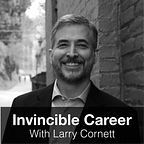📚 If you’ve ever thought about starting your own business at some point in your career, check out my Solopreneur workshop.

I see too many people stuck in a “holding pattern” in their lives and careers. If you push, you find out that they already know what they should do.
They just refuse to accept it.
In some cases, it seems like they’re waiting for a “hero” to come along and rescue them. The problems they’re facing feel insurmountable. Taking action feels too scary. They don’t feel capable for one reason or another.
Well, I have some bad news:
Politicians aren’t going to save you (or the planet).
Leaders aren’t going to rescue you (or look after your career).
A talent agent isn’t going to miraculously discover you at your day job.
An editor isn’t going to pull a draft off your laptop and run screaming to a publisher, “Look at this masterpiece! We must publish this!”
No one cares more about you than you do (except maybe your Mom).
“No one is coming to save you; no one is coming to make life right for you; no one is coming to solve your problems. If you don’t do something, nothing is going to get better. The dream of a rescuer who will deliver us may offer a kind of comfort, but it leaves us passive and powerless. We may feel if only I suffer long enough, if only I yearn desperately enough, somehow a miracle will happen, but this is the kind of self-deception one pays for with one’s life as it drains away into the abyss of unredeemable possibilities and irretrievable days, months, decades.”
― Nathaniel Branden, Six Pillars of Self-Esteem (My affiliate link. As an Amazon Associate I earn from qualifying purchases.)
Repeat after me:
No one is coming to save me.
No one cares about my future more than I do.
I have to step up and become the hero in my own story.
I’m sure there is something that you want to do, but you haven’t made it happen yet. There’s a change you want to make in your life, but you’ve been holding back and haven’t taken the first step. You want something more out of your career, but you keep waiting and waiting.
Answer these questions truthfully. Be honest; even it hurts to say it out loud:
What excuses am I making?
Why am I not taking action?
What am I waiting for?
What am I afraid of?
Do I want to live with the regret of not trying for the rest of my life?
What’s the worst that could happen if I do take action?
What’s the best that could happen?
It isn’t that you don’t know what to do. Ok, maybe there are some things that you need to learn, practice, and master (BTW someone like me is here to help). But, I would guess that you really do know what you should be doing.
There isn’t some secret to success that only a few people at the top have discovered. Heck, are there any secrets to success anymore?
We have millions of books and websites at our fingertips, loaded with stories of success, advice, and recommendations. There are more than enough examples to follow.
We all have the knowledge. If that knowledge is so evident that it seems like common sense, why doesn’t it become standard practice? Why isn’t everyone doing what it takes?
It isn’t that people don’t know what it takes to achieve success.
It’s that most people aren’t willing to do what it takes to achieve success.
They never overcome the inertia even to get started. They don’t sustain the effort required. Or, they bail as soon as things become uncomfortable or painful.
Taking consistent action despite the uncertainty, fear, and discomfort sets the winners apart from the masses. Successful people make things happen.
If there is any secret to adopting the successful habits that generate successful results, I think it comes down to three things:
Accountability
Commitment
Integrity
Winners take the knowledge that is available to all of us, and they take action. They actually do something with it. These three forces drive them to succeed in building their new habits.
Accountability
Accountability is a potent psychological tool. When I’ve witnessed people fail to make a positive change in their life, it can often be traced to a lack of accountability.
No one is watching, so who cares?
On the flip side, I also know people who were able to turn around a failed habit plan by adding accountability. Once they knew that others were aware of their success or failure, they renewed their efforts.
Why? Because they were finally accountable to someone. They didn’t want to disappoint that person. They made a promise, and they were reluctant to let that person down.
I observed this firsthand with my journey back to fitness. The most significant change in my exercise habits came from the four years I spent doing CrossFit.
I had dabbled in exercise for over a decade, but I knew no one was watching. I wanted to sleep in when I felt tired, and it was all too easy to pull the blankets back up and skip my morning workout.
Love it or hate it, CrossFit changed that for me.
Yes, there certainly was a decent amount of knowledge and skill acquisition thanks to the coach, which did help set me on a better path. But, knowing that my CrossFit group was waiting every morning helped me get out of bed on the coldest days. Picturing the disappointment of my lifting partner kept me showing up, even when I desperately wanted to skip that day.
I was accountable to them, and I knew it.
They would hold me to that promise, and I experienced their disappointment if I did happen to miss a session. There was always someone who would say, “Nice of you to show up today. Where in the hell were you yesterday?”
I recently interviewed Brigitte Granger, founder of Supporti, for my podcast. Her startup is all about helping people find accountability partners. She shared a similar story about her running buddy. She showed up to run on the coldest Boston mornings because her friend was waiting.
As human beings, we want to belong. We seek approval and acceptance. We avoid the disapproval of the group.
Find the right people who will support and encourage your new habit, make yourself accountable to them, and you’ll significantly increase your odds of sustained success.
I’ve shared this data before, but I’ll include it again because it still blows my mind. The Association for Talent Development (ATD) performed a study on accountability and found the following probabilities of accomplishing a goal:
10% if you simply have a goal in mind
25% if you consciously decide that you will achieve it
40% if you set a date by which you will achieve it
50% if you create a plan for how you will do it
65% if you make a promise to someone else that you will do it
95% when you make specific accountability appointments with that person (this is probably why 1-on-1 career coaching works so well)
At some point, once your habits are established, you may be able to create a plan to be accountable to yourself.
I transitioned to this after my time at CrossFit. I knew what I needed to do. I had a clear training program and schedule. I am pretty hard on myself.
When I tell myself that I will work out for an hour and do this many sets and reps, I will refuse to stop until I do it. I don’t want to disappoint my future self.
Commitment
I read an interesting article by Mark Manson related to success, happiness, and struggles in life. He said:
“What determines your success isn’t ‘What do you want to enjoy?’ The question is, ‘What pain do you want to sustain?’ The quality of your life is not determined by the quality of your positive experiences but the quality of your negative experiences. And to get good at dealing with negative experiences is to get good at dealing with life.”
— Mark Manson
Commitment is your plan to see things through and persist through the discomfort and pain. It is the promise you make to your accountability partners.
It means that you will commit to fulfilling that promise, even when it would be easier to give up. You commit to a long-term goal over short-term pleasure.
When you commit to the people who will hold you accountable, breaking that commitment must have consequences. Sometimes those consequences come from the person or the group (e.g., disappointment, shunning, or even expulsion).
Lifelong change comes when you internalize the consequences of abandoning your integrity (more on this next).
Winners also commit to a process. A daily practice often trumps goal setting, which can seem intangible at times.
The luster of that goal can lose its shine in the face of adversity. Therefore, successful people tend to structure their lives to optimize their chances of continuous progress.
“We are what we repeatedly do. Excellence, then, is not an act, but a habit.”
— Will Durant
Integrity
When people with deep integrity give their word, they keep their word. If they say they are going to do something, they will do it. They have aligned their behavior with their internal values.
No if, ands, or buts.
No excuses. No hedging. No complaints.
It is this integrity that makes accountability work even better. Sadly, I have known people who were accountable to others and aware of that accountability, yet they still let those people down. When questioned, they would make excuses about why they couldn’t follow through on their commitment.
Accountability occurs when you make a promise to others — or even yourself — that you will do something. Possessing integrity means that you will honor that promise because doing so is in alignment with the values you hold dear.
One of my favorite books is Conscious Business: How to Build Value Through Values (my affiliate link) by Fred Kofman. He talks about the importance of “essential integrity.” He even goes so far as to claim that happiness is tied to integrity, not necessarily achieving success.
“Most people believe that happiness is an outcome, a result that accrues to the winner. This is just not true… Happiness comes from integrity rather than success, from behavior in alignment with essential values rather than winning or losing.”
— Fred Kofman
So, not only will integrity help you remain accountable to achieve your goals, it may lead to greater happiness. We all have experienced how bad it feels to behave in ways that aren’t aligned with our values and beliefs. Maintaining your integrity ensures that it won’t occur.
Optimize for your own success
Making a change is hard. Giving up bad habits feels impossible at times. Establishing new positive habits seems insurmountable.
Commit to a consistent daily process. Start small, but simply keep going and do not stop. Actions create progress. Progress fuels accomplishments.
Some examples:
Journal every day as you enjoy your morning coffee or tea. It doesn’t take long.
Set a timer and write for at least 15 minutes every day. If the words are flowing, keep going when the timer stops. But, worst case, it’s only 15 minutes!
Commit to working out every day. Do 15 minutes of a warmup, stretches, and start to exercise, even on days when you don’t feel like it. You’ll be surprised to discover that you’ll often want to keep going when the 15 minutes is up.
Every week, spend one hour reading a book that contributes to your professional development or personal growth (steal the time from Netflix).
Spend 30 minutes networking online every week.
Spend one hour working on the future of your career or your dream business plan every weekend.
Make a promise that you will make the change you want most in your life. Make a promise to honor your commitment. Maintain your integrity to deliver on that promise.
Finally, use accountability as the most powerful tool to keep yourself honest. Find someone you trust to keep you on track. Ask that person to hold you accountable and schedule regular check-ins to track your progress.
If you’re the kind of person who can hold yourself accountable, that’s great. But, if you need to be accountable to someone else to ensure that you follow through, find that accountability partner.
I play that role for my clients. I do have a process, and I often have unique insights because I can see things from a different perspective. But, many of my clients know what they should be doing to invest in themselves and their careers.
I will share some advice with them, and they will literally say, “I know, I know. I really should be doing that. Thank you for the reminder and for giving me a kick in the butt.”
Sometimes all we need is that kick in the butt. Someone to believe in us, encourage us, and remind us why we started this journey in the first place.
We usually know what we need to do. We just need a gentle push to keep us doing it.
⬆️ Scroll to the top if you want to listen to my more detailed reading of this article🎧
Ready to join my private community?
Subscribe now, and I’ll send you an invitation to join my private community of ambitious professionals who help each other become more successful and fulfilled in their working lives. Once you’re in, you’ll be able to participate in our exclusive office hours every week and chat with the other members and me every day!
Are you ready to turn a $15/month investment into thousands of dollars of increased income every year? That’s precisely what has happened for many people in my community.
However, I do know that not everyone is ready to become a paid subscriber yet. But, there is a great way you can support my work without spending any money:
📣 Recommending my newsletter on social media 📣
It only takes a few seconds, and it helps grow my business so I can continue making time to write it.
I’ll even provide some copy and paste text to make it easy to share on Twitter, Reddit, LinkedIn, Facebook, etc. Thanks in advance!
I've really been enjoying the Invincible Career newsletter by Larry Cornett (@cornett). If you want to get ahead at work and be happier in your job, but you aren’t subscribed yet, you’re missing out.
https://newsletter.invinciblecareer.com
This week’s office hours topic
⭐ Office Hours - How to Choose Podcasting Solutions
Larry Cornett is a leadership coach and business advisor who hosts a private mastermind community for ambitious professionals with weekly challenges, office hours, and 24x7 support. If you’re interested in starting your own business someday (or accelerating an existing one), check out his “Employee to Solopreneur” course.
Larry lives in Northern California near Lake Tahoe with his wife and children, and a gigantic Great Dane. He does his best to share advice to help others take complete control of their work and life. He’s also on Twitter @cornett.












